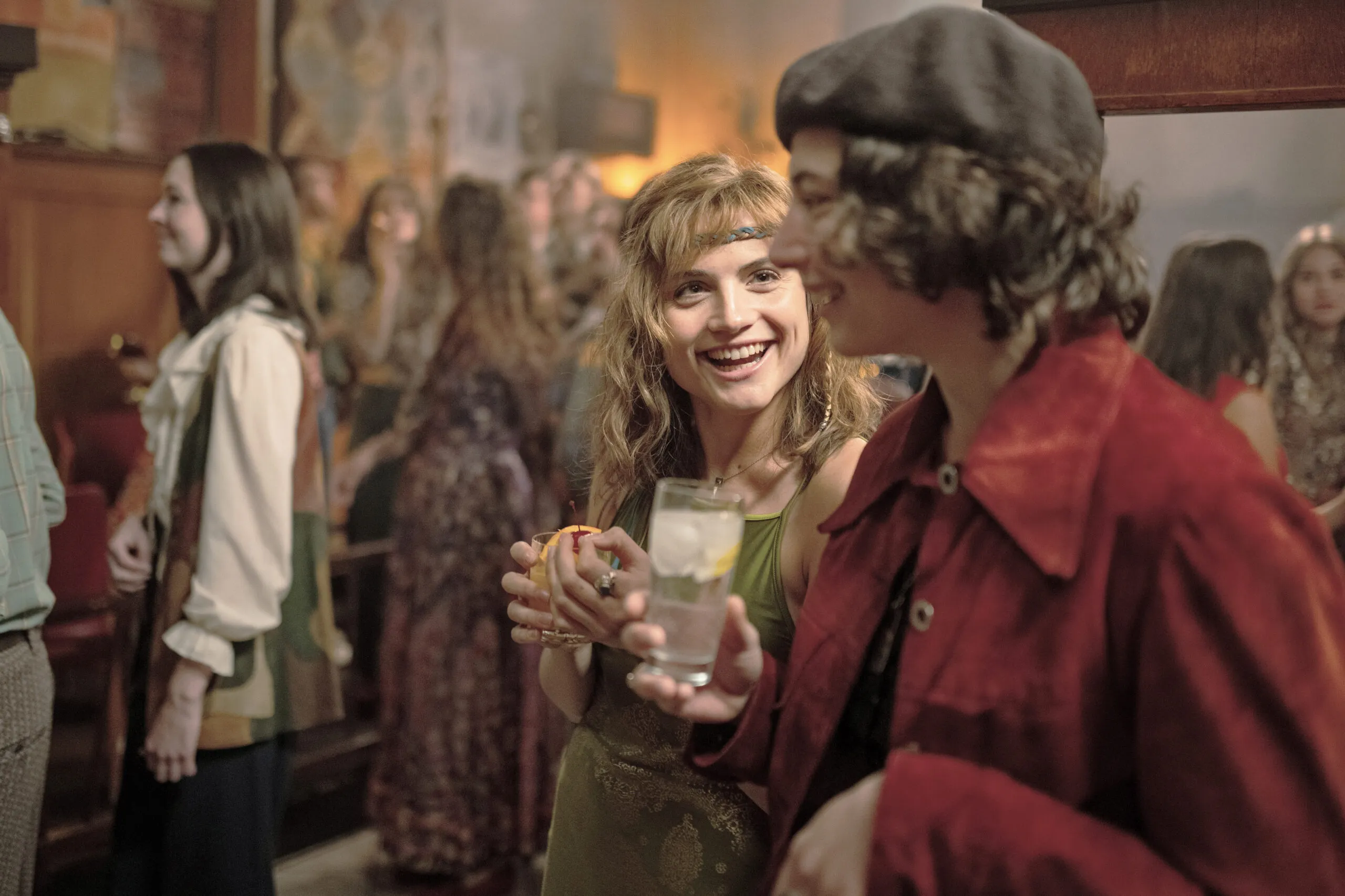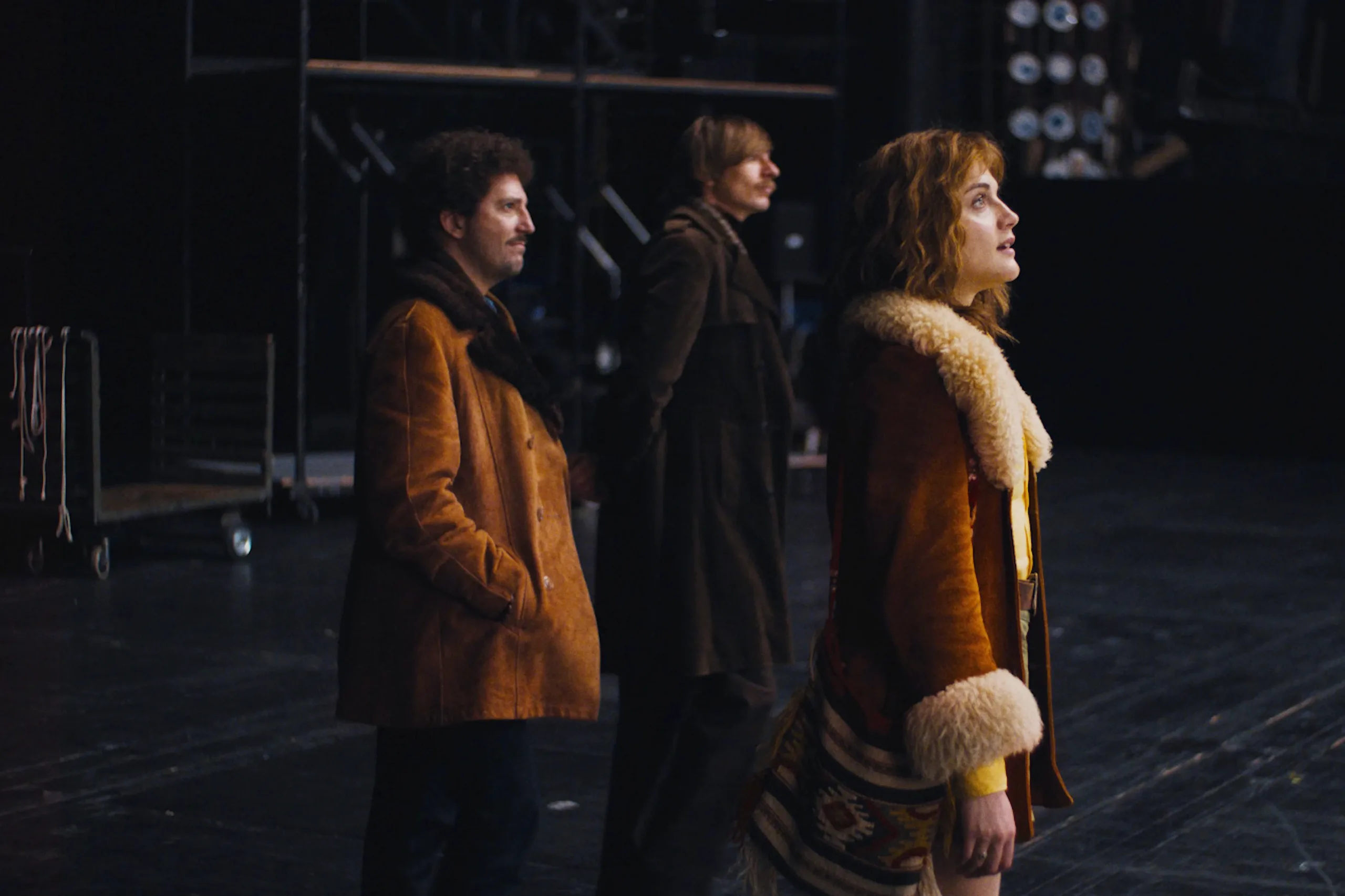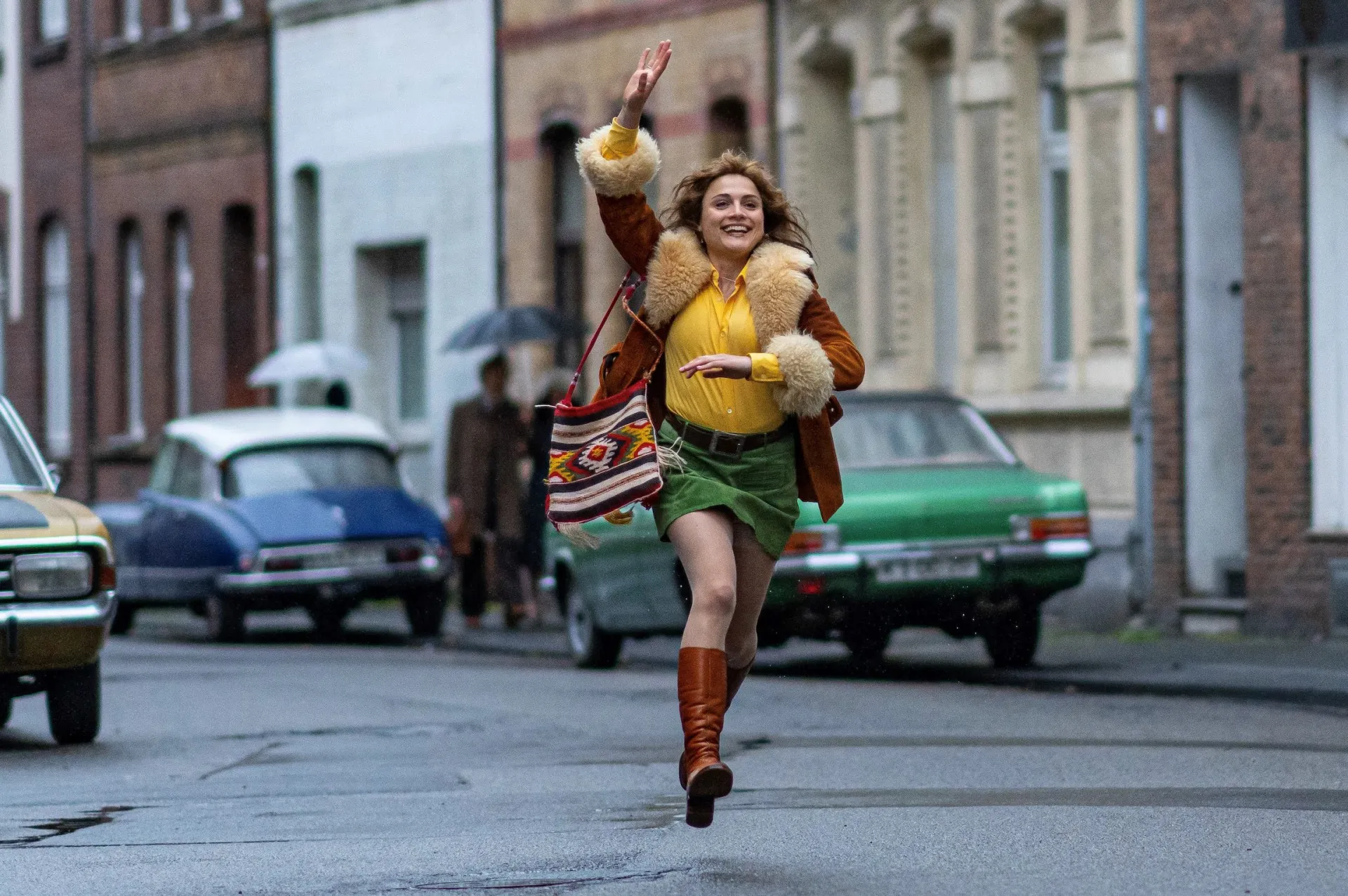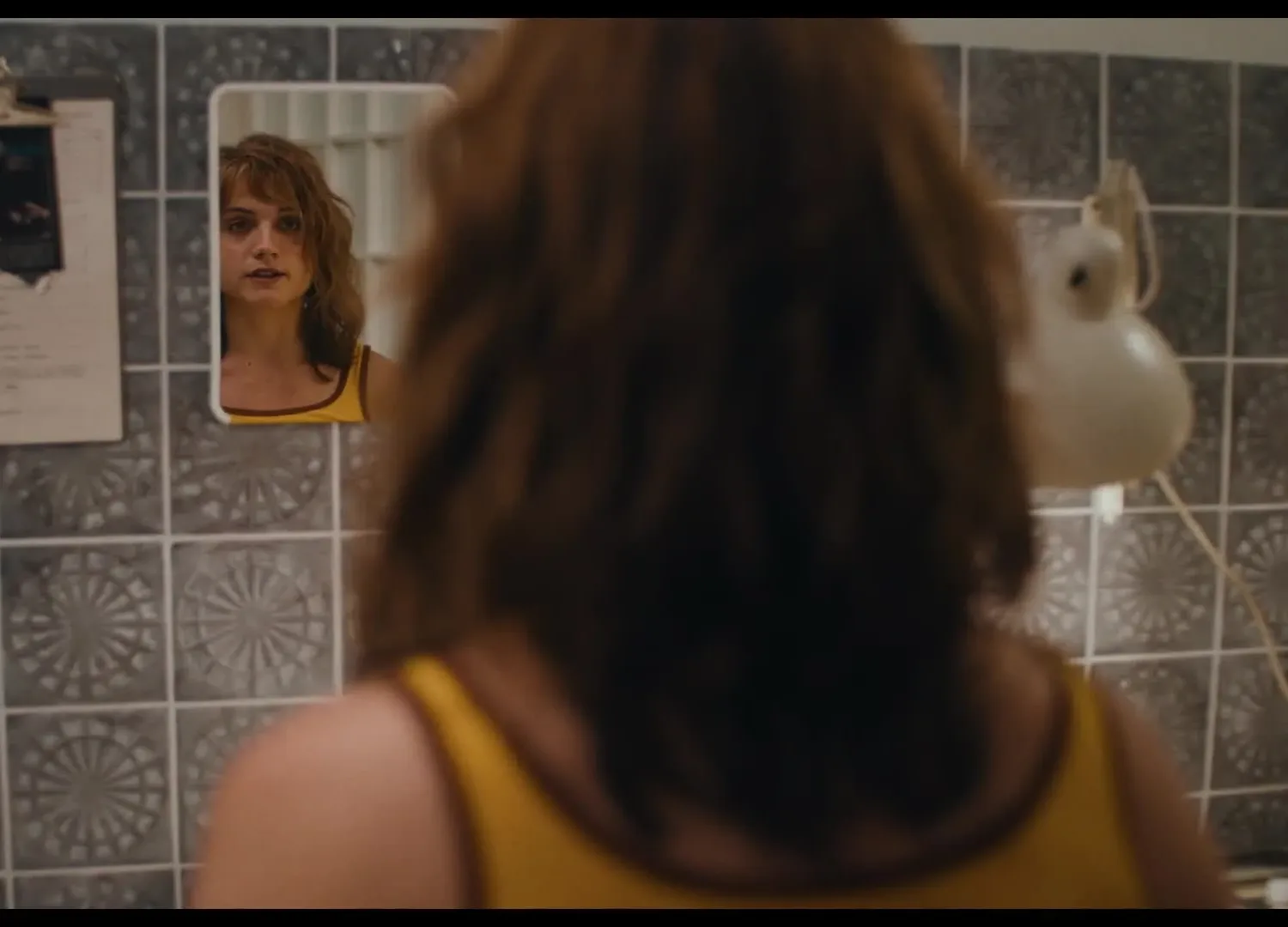Ido Fluk’s Köln 75 unfolds the night when an 18-year-old promoter named Vera Brandes risked everything to bring Keith Jarrett’s improvised solo concert to life at the Cologne Opera House in January 1975. Directed and written by Fluk, the film stars John Magaro as the moody, perfectionist Jarrett; Mala Emde and Susanne Wolff as Vera in youth and midlife, respectively; Michael Chernus as the wry jazz critic Michael Watts; and Alexander Scheer as ECM founder Manfred Eicher.
At once a coming-of-age comedy, a backstage drama, and a self-aware historical pageant, the film weaves voice-over commentary into its storytelling, reminding us that sometimes the scaffold matters as much as the masterpiece it supports.
What feels vital here is the collision of spontaneous artistry and resourceful spirit—two forces that almost let the show be canceled. As jazz fascinates me for its leap into the unknown, Köln 75 feels like a nod to the French New Wave’s embrace of unpredictability and to the DIY ethos of modern independent cinema. It captures an iconic moment by honoring its messy, human building blocks.
Echoes of a Jazz Revolution
Long before Ido Fluk put camera to film, Keith Jarrett’s 1975 solo at the Cologne Opera House had already become legend—an improvised marathon that transformed a chilly January night into a transcendent musical pilgrimage.
The Köln Concert album went on to exceed four million in sales, making it the best-selling solo piano record ever and a touchstone for anyone who believes in the magic of in-the-moment creation. That story still pulses through jazz clubs today, from dimly lit corners playing Can and Floh de Cologne to late-night listening sessions at home.
In early ’70s Germany, youth culture was riding the aftermath of student protests and experimenting beyond mere politics. Bands like Can tapped into that restless spirit; film movements, too, mirrored it—think Godard’s jazz-driven sequences in Bande à part. Fluk sets Köln 75 against this backdrop of countercultural urgency, where Vera Brandes’s guerrilla-style gigs felt more revolutionary than her strict father’s dental practice.
On screen, John Magaro’s Jarrett carries the weight of a former Miles Davis sideman turned solo visionary, hunched over the keys yet reaching for something unnamable. Opposite him, Mala Emde’s teenage Brandes channels the same idealism I recognize from Greta Gerwig’s early protagonists—bright, headstrong, convinced that art can reshape the world. Alexander Scheer’s Manfred Eicher rounds out the trio, the ECM founder whose quiet resolve ensured that at least one engineer and an oddball piano technician showed up in time.
Behind the scenes, Fluk chose to highlight the scaffolding—the midnight phone calls, cash-for-tickets schemes, and last-minute piano fixes—rather than simply recreate a concert. Archival clips and a fourth-wall–breaking narrator weave documentary textures into the drama, recalling the playful self-awareness of French New Wave. It’s an approach that reminds me why I fell for independent cinema: those daring collisions of fact, fiction, and sheer human grit.
Building the Concert: A Nonlinear Construction
Fluk throws us into the deep end with Michael Watts’s sardonic voiceover, framing Köln 75 around the idea that we’re seeing the scaffolding, not the Sistine Chapel itself. In true French New Wave fashion—think Godard’s playful refusal of seamless transitions—the film cuts from Watts advising an imaginary audience straight to a 50-year-old Vera Brandes celebrating her milestone birthday. That flash-forward plants the seed of narrative curiosity: How did a teenager become the linchpin of jazz history?
We then tumble backward into Vera’s origins. One moment she’s furtively dialing Ronnie Scott’s club on her father’s private dental line; the next, she’s scribbling itineraries and haggling over gig fees. These early vignettes, reminiscent of Truffaut’s episodic charm, establish her drive against a household that sees jazz as taboo. Family tensions ripple beneath every phone call, grounding the story in personal stakes.
The road trip sequence reunites Jarrett (John Magaro), Eicher (Alexander Scheer), and our critic-narrator in a cramped Renault. Magaro’s slumped posture and halting dialogue convey back pain and cabin fever, while quick cuts and diegetic engine hum underscore their exhaustion. It’s a masterclass in editing economy: you sense every mile and every creak of that old piano in the backseat.
Obstacles pile up like sheet music on a stand—an 11:30 p.m. slot after Lulu, a missing 10,000 DM budget, and an out-of-tune rehearsal piano missing a pedal. Fluk intersperses title cards and archival stills to ratchet up urgency, channeling the resourcefulness of indie cinema where low budgets breed narrative ingenuity.
At the climax, Vera’s frantic enlistment of piano tuners and engineers plays out in a seamless long take that feels almost documentary-real. Jarrett’s grudging decision to play, captured in a tight close-up, owes more to persuasive human drama than any scripted epiphany.
Finally, a few seconds of Jarrett at the keyboard—voiceover muted—give way to applause and an end-credits scroll that charts Brandes’s rise from teen promoter to industry stalwart, reminding us that the real encore happened offstage.
Characters Under the Spotlight
Mala Emde captures Vera Brandes’s fierce passion with bright-eyed intensity, then shifts into the quiet confidence of Susanne Wolff’s 50-year-old reflection. Young Vera races through phone lines and concert halls, every frame buzzing with entrepreneurial zeal.
At fifty, she pauses before her past with a measured gaze, hinting at the weight of hindsight. Their combined performance charts a transformation from jazz-obsessed teenager into industry veteran, and it feels grounded in genuine emotion—like watching Truffaut’s The 400 Blows heroine grow up across two lifetimes.
John Magaro’s Keith Jarrett feels haunted and alive in equal measure. His hunched posture, fleeting grimace of pain and sudden moments of bliss on the piano keys reveal a man driven by perfection and limited by physical strain. Magaro doesn’t grandstand; he lets tiny gestures—a finger’s tremor, an exhaled breath—speak volumes about the artist’s inner conflict. The chemistry with Alexander Scheer’s Manfred Eicher adds another layer: Scheer’s calm pragmatism balances Jarrett’s volatility, creating a partnership that resembles the quiet tension of a Noah Baumbach scene.
Michael Chernus pops up as Michael Watts with just enough swagger to keep us intrigued without pulling us out of the story. When he breaks the fourth wall, his jazz primers land like friendly lectures at a local record shop. He juggles self-aware humor and genuine admiration for Jarrett, making his commentary a welcome guide rather than a distracting gimmick.
Scheer’s Eicher brings a gentle steadiness to every frame he occupies. He watches over Jarrett with protective concern, then slips effortlessly into the role of hard-nosed producer when funds run low. His restrained delivery highlights the contrast between artistic impulse and business reality.
A supporting cast filled with friends, rivals and family rounds out the picture. Daniel Betts’s Ronnie Scott offers a mentor’s nod, while Vera’s brother and buddies move through their own teenage dramas with spot-on authenticity. Their moments of awkward loyalty remind us that every great performance depends on a team working behind the scenes.
Scaffolding Creativity and Collective Drive
At the heart of Köln 75 lies the idea that masterpieces demand unseen support. The “scaffolding” metaphor, introduced by Michael Watts’s voice, reminds us that grand performances rely on countless improvised fixes: a borrowed piano tuner, a last-minute fundraiser, a teenager’s unrelenting calls. This focus on process feels like a nod to Godard’s playful deconstruction of film form—celebrating the gears as much as the finished product.
Jarrett’s improvisation emerges from genuine limits. Confronted with a shabby, out-of-tune rehearsal piano, he’s forced to explore the instrument’s middle register. That constraint reshapes his performance, turning obstacles into artistic fuel. I was struck by how often creativity thrives when resources run low—an idea I first admired in Béla Tarr’s stark black-and-white frames or Jim Jarmusch’s minimalist soundscapes.
Vera Brandes embodies youthful defiance. In a household ruled by her orthodontist father’s rigid expectations, she carves out space for a female voice in a male-dominated music world. Her guerrilla bookings and coded phone calls feel as urgent today as Greta Gerwig’s heroine asserting autonomy in a world built for others. This thread captures a broader moment when young women demanded both artistic respect and leadership roles.
Fluk blurs factual and fictional layers through Watts’s self-aware narration and archival flashes. Each cut between dramatization and real clips poses a question: can memory ever be neutral? These moments remind me of Truffaut’s nervous Fourth Wall breaks, where storytelling acknowledges its own artifice without losing emotional pull.
Finally, the film celebrates teamwork across generations. Jarrett’s brilliance, Eicher’s steady hand, Brandes’s ambition, and Watts’s commentary form an unlikely alliance. Their shared passion, captured in careful close-ups and ambient sound design, shows how risk-taking requires more than one person daring to step onto the stage.
Visual Rhythms and Sonic Spaces
Ido Fluk balances pulse-quickening sequences with moments of quiet reflection. Early scenes feel like a spin on Jean-Luc Godard’s jump cuts—rapid cuts showing Vera darting through Cologne’s streets—followed by stretches where the camera lingers on Jarrett’s face as he braces for pain. That contrast mirrors the creative tension between urgency and patience, and it reminded me of François Truffaut’s use of silence in Jules et Jim to let emotion settle.
Cinematographer Philipp Kirsamer captures 1970s Germany in muted earth tones and soft neon glows. Night exteriors of cobblestone alleyways feel soaked in cigarette smoke and promise. Once the road trip begins, a handheld camera drifts alongside the Renault, framing Magaro’s hunched shoulders against the dashboard gauges. Close-ups of his fingers fumbling a piano key carry as much weight as the dialogue.
Costuming and production design ground the drama in its era: Vera’s mini-skirts, shearling jackets, and go-go boots pop against her father’s buttoned-up dental office. I loved spotting the rotary-dial phone on his desk—small details that whisper authenticity without calling attention to themselves.
The editing stitches archival photos and grainy footage into the narrative, urging us to question what’s lived experience and what’s staged. A freeze frame of Jarrett mid-riff, courtesy of a real newspaper clipping, feels deliciously out of sync before we plunge back into the actors’ world.
On the soundtrack, Fluk reaches for German rock from Can and Floh de Cologne rather than the concert itself. Their pulsing rhythms underscore Vera’s adrenaline, while sudden pockets of silence—literally no sound for a beat—create a space to feel her relief or Jarrett’s hesitation. As someone who first fell for film through its sonic power in Jim Jarmusch’s work, I appreciated how Köln 75 uses both music and its absence to shape emotion.
Parting Reflections
In balance, Köln 75’s greatest triumph lies in its spirited performances and the clever spotlight it casts on the hidden work behind a legendary concert. Magaro and Emde carry the film with magnetic energy, while Fluk’s scaffold metaphor gives fresh life to a well-worn music biopic template. The production design and period detail envelop you in a convincing 1970s world, and the decision to weave in archival flashes keeps the drama grounded in real history.
Yet the story occasionally splits focus, and without Jarrett’s actual music, some of the emotional peaks feel muted. At times the tone hops between teen-caper zest and sober backstage drama as if straddling two genres without fully committing to either.
Positioned between indie daring and mainstream appeal, Köln 75 reimagines what a concert film can be—less about the final applause and more about the late-night phone calls that made it possible. Fans of origin-story dramas and stylish period pieces will find plenty to enjoy; hardcore jazz devotees may yearn for deeper musical immersion.
Full Credits
Director: Ido Fluk
Writers: Ido Fluk
Producers: Sol Bondy, Fred Burle
Executive Producers: Lillian LaSalle, Oren Moverman, Annegret Weitkämper-Krug
Co-Producers: Ewa Puszczyńska, Dries Phlypo, Fabien Arséguel, Elena Diesbach, Tobias Lehman
Cast: Mala Emde (Vera Brandes), John Magaro (Keith Jarrett), Michael Chernus (Michael Watts), Alexander Scheer (Manfred Eicher), Ulrich Tukur (Dr. Brandes), Jördis Triebel (Ilse Brandes), Susanne Wolff (Vera Brandes at 50), Enno Trebs (Jan), Shirin Lilly Eissa (Isa), Leo Meier (Fritz)
Director of Photography (Cinematographer): Jens Harant
Editor: Anja Siemens
Composers: Hubert Walkowski, Stefan Rusconi
Sound Design: Frederik van de Moortel
Production Design: Jutta Freyer
Casting: Emrah Ertem
Production Companies: One Two Films (Germany), Extreme Emotions (Poland), Lemming Film (Belgium), Alamode Filmproduktion (Germany)
World Sales: Bankside Films
The Review
Köln 75
Köln 75 charms with energetic lead turns and a smart focus on the unseen effort behind a legendary performance, even if its shifting tone and lack of Jarrett’s own music undercut some emotional highs.
PROS
- Magnetic lead turns from John Magaro and Mala Emde
- Clever “scaffolding” metaphor adds fresh perspective
- Authentic 1970s production design and costumes
- Dynamic editing and sound build real tension
- Meta-narration by Michael Chernus keeps things lively
CONS
- Absence of Jarrett’s actual music weakens key moments
- Shifts between comic and dramatic tones can feel jolting
- Some supporting characters lack depth
- Nonlinear jumps may leave viewers disoriented





















































